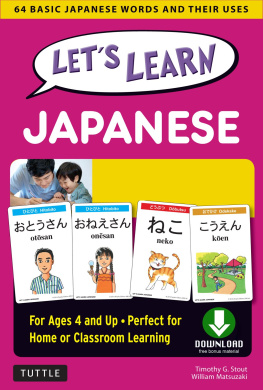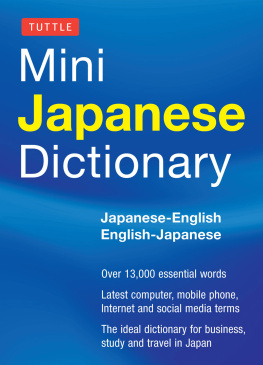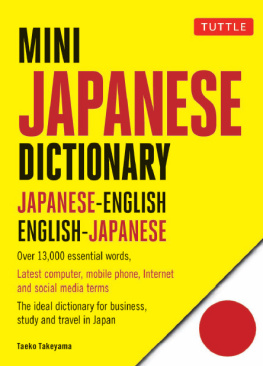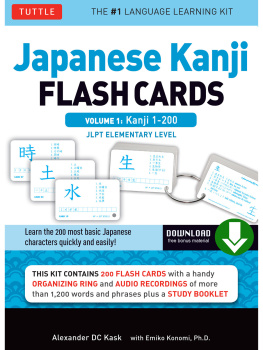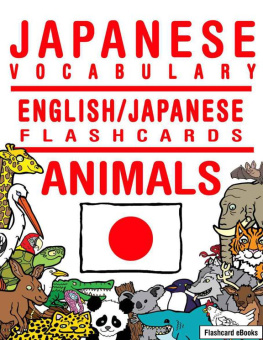Japanese vocabulary for English speakers - 9000 words
By Andrey Taranov T&P Books vocabularies are intended for helping you learn, memorize and review foreign words. The dictionary is divided into themes, covering all major spheres of everyday activities, business, science, culture, etc. The process of learning words using T&P Books theme-based dictionaries gives you the following advantages: Correctly grouped source information predetermines success at subsequent stages of word memorization Availability of words derived from the same root allowing memorization of word units (rather than separate words) Small units of words facilitate the process of establishing associative links needed for consolidation of vocabulary Level of language knowledge can be estimated by the number of learned words Copyright 2014 T&P Books Publishing All rights reserved No part of this book may be reproduced or utilized in any form or by any means, electronic or mechanical, including photocopying, recording or by information storage and retrieval system, without permission in writing from the publishers. T&P Books Publishing
www.tpbooks.com ISBN: 978-1-78071-123-2 Smashwords Edition
JAPANESE VOCABULARY
for English speakers
Contains the most commonly used words Recommended as an addition to any language course Meets the needs of beginners and advanced learners of foreign languages Convenient for daily use, reviewing sessions, and self-testing activities Allows you to assess your vocabulary T&P Books vocabularies are intended for helping you learn, memorize and review foreign words. This vocabulary contains over 9000 commonly used words arranged thematically. 256 themes cover all major aspects of everyday activities, business, science, culture, etc.
Foreign language learners often feel the necessity to enrich their vocabulary with new words and review the materials they have studied before in order to talk on different subjects more fluently and comprehensively. Conventional dictionaries with alphabetical arrangement of words fail to produce effective results, whereas theme dictionaries from T&P Books are specially designed to elevate the convenience of studying and reviewing the vocabulary. This vocabulary book can be used as an addition to a foreign language course textbook or a course. It will become an invaluable helper during a trip abroad. T&P Books dictionaries are particularly convenient to use for multiple reviewing, which is crucial for producing positive results in language learning.
ABBREVIATIONS
used in the vocabulary
ab. about
adj adjective
adv adverb
anim. animate
as adj attributive noun used as adjective
e.g. for example
etc. et cetera
fam. familiar
fem. feminine
form. formal
inanim. inanimate
masc. masculine
math mathematics
mil. military
n noun
pl plural
pron. pronoun
sb somebody
sing. singular
sth something
v aux auxiliary verb
vi intransitive verb
vi, vt intransitive, transitive verb
vt transitive verb
PRONUNCIATION GUIDE
Hiragana Katakana Rmaji Japanese example T&P phonetic alphabet English example
Consonants
a [a] shorter than in ask i [i], [i:] feet, Peter u [u], [u:] book, shoe e [e] elm, medal o [] bottle, doctor ya [j] young, yard yu [ju] youth, usually yo [j] New York
Syllables
b [b] baby, book ch [] cheese d [d] day, doctor f [f] face, food g [g] game, gold h [h] home, have j [] joke, general k [k] clock, kiss m [m] magic, milk n [n] name, normal p [p] pencil, private r [r] rice, radio s [s] city, boss sh [] sheep, shop t [t] tourist, trip ts [] cats, tsetse fly w [w] vase, winter z [] beads, kids
BASIC CONCEPTS
Pronouns
I, me watashi you anata he kare she kanojo we watashi tachi you (to a group) anata ga ta they karera wa
Greetings. Salutations. Farewells
Hello! (fam.) y! Hello! (form.) konnichiwa! Good morning! ohay! Good afternoon! konnichiwa! Good evening! konbanwa! to say hello konnichiwa to iu Hi! (hello) y! greeting (n) aisatsu to greet (vt) aisatsu suru How are you? genki ? How are you? (form.) wo genki desu ka? How are you? (fam.) genki ? What's new? chshi ha d ? Bye-Bye! Goodbye! saynara! Goodbye! (form.) saynara! Bye! (fam.) baibai! See you soon! j ne! Farewell! saraba ! to say goodbye wakare wo tsugeru So long! mata ne! Thank you! arigat! Thank you very much! dmo arigat! You're welcome ditashimashite Don't mention it! rei nante yo It was nothing ditashimashite Excuse me! (fam.) shitsurei! Excuse me! (form.) shitsurei itashi masu! to excuse (forgive) yurusu to apologize (vi) ayamaru My apologies owabi itashi masu! I'm sorry! gomennasai! to forgive (vt) yurusu It's okay! daijbu desu! please (adv) onegai Don't forget! wasure nai de! Certainly! mochiron! Of course not! sonna koto nai yo! Okay! (I agree) k! That's enough! m jbun da!
How to address
Excuse me! sumimasen , mister, sir san ma'am san miss san young man san young man (little boy) chan miss (little girl) chan
Cardinal numbers. Part 1
0 zero zero 1 one ichi 2 two ni 3 three san 4 four yon 5 five go 6 six roku 7 seven nana 8 eight hachi 9 nine ky 10 ten j 11 eleven j ichi 12 twelve j ni 13 thirteen j san 14 fourteen j yon 15 fifteen j go 16 sixteen j roku 17 seventeen j shichi 18 eighteen j hachi 19 nineteen j ky 20 twenty ni j 21 twenty-one ni j ichi 22 twenty-two ni j ni 23 twenty-three ni j san 30 thirty san j 31 thirty-one san j ichi 32 thirty-two san j ni 33 thirty-three san j san 40 forty yon j 41 forty-one yon j ichi 42 forty-two yon j ni 43 forty-three yon j san 50 fifty go j 51 fifty-one go j ichi 52 fifty-two go j ni 53 fifty-three go j san 60 sixty roku j 61 sixty-one roku j ichi 62 sixty-two roku j ni 63 sixty-three roku j san 70 seventy nana j 71 seventy-one nana j ichi 72 seventy-two nana j ni 73 seventy-three nana j san 80 eighty hachi j 81 eighty-one hachi j ichi 82 eighty-two hachi j ni 83 eighty-three hachi j san 90 ninety ky j 91 ninety-one ky j ichi 92 ninety-two ky j ni 93 ninety-three ky j san
Cardinal numbers. Part 2
100 one hundred hyaku 200 two hundred ni hyaku 300 three hundred san byaku 400 four hundred yon hyaku 500 five hundred go hyaku 600 six hundred roppyaku 700 seven hundred nana hyaku 800 eight hundred happyaku 900 nine hundred ky hyaku 1000 one thousand sen 2000 two thousand nisen 3000 three thousand sanzen 10000 ten thousand ichiman one hundred thousand jyman million hyakuman billion joku
Ordinal numbers
first (adj) dai ichi no second (adj) dai ni no third (adj) dai san no fourth (adj) dai yon no fifth (adj) dai go no sixth (adj) dai roku no seventh (adj) dai nana no eighth (adj) dai hachi no ninth (adj) dai ky no tenth (adj) dai j no
Numbers. Fractions
fraction buns one half ni bunno ichi one third san bunno ichi one quarter yon bunno ichi one eighth hachi bunno ichi one tenth jy bunno ichi two thirds san bunno ni three quarters yon bunno san
Numbers.
Basic operations
subtraction hikizan to subtract (vi, vt) hikizan suru division warizan to divide (vt) wareru addition kasan to add up (vt) kasan suru to add (vi, vt) tasu multiplication kakezan to multiply (vt) kakeru
Numbers. Miscellaneous
digit, figure keta s number sji numeral sshi minus sign fug plus sign sei fug formula kshiki calculation keisan to count (vt) keisan suru to count up kazoeru to compare (vt) hikaku suru How much? ikura ? How much? ikura ? How many? ikutsu ? sum, total gkei result kekka remainder jyo, amari a few shs no few, little (adv) sukoshi the rest nokori one and a half 1,5 ittengo dozen dsu in half (adv) hanbun ni equally (evenly) kint ni half hanbun time (three ~s) kai







